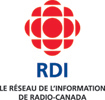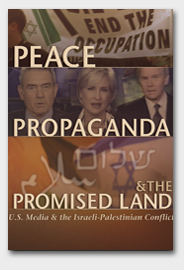
Radio-Canada Agrees to Air New Documentary
November 10, 2008
Dear HonestReporting Canada subscriber:
On October 31, we
questioned why
Radio-Canada, the French-arm of CBC, had aired the
pro-Palestinian advocacy film "Peace, Propaganda and the
Promised Land" on its documentary program "Les grands
reportages". We felt that in airing this film, Radio-Canada
failed to
inform its viewers that the "documentary" was not an objective
study of media coverage of the Arab-Israeli conflict,
but instead was a pro-Palestinian advocacy tool with a political
agenda, rife with errors and omissions that have seriously
misled Canadians.
We felt that in airing this film, Radio-Canada
failed to
inform its viewers that the "documentary" was not an objective
study of media coverage of the Arab-Israeli conflict,
but instead was a pro-Palestinian advocacy tool with a political
agenda, rife with errors and omissions that have seriously
misled Canadians.
Thanks to your many emails, Radio-Canada acknowledged that their host's introduction was poorly presented and out of context given Israel's withdrawal from the Gaza Strip in 2005. Furthermore, the network committed to air additional "documentaries providing different perspectives on the situation in Israel and Gaza" in the coming months. Many of our members who complained to Radio-Canada received the following reply from their Director of Complaints for French Services, which noted among other things, that the film was "clearly pro-Palestinian":
"Dear Sir or Madam,
We received your comments about the documentary Peace, Propaganda & the Promised Land, whose French version aired October 23 on RDI as part of Les grands reportages.
First, allow me to briefly explain the context in which we air documentaries. It is an acknowledged fact that with the documentary format, the author's perspective forms a significant part of the production. In nearly all cases, these films are shot by directors with no affiliation to Radio-Canada. We choose to broadcast them because we feel they contain noteworthy information.
In airing point-of-view documentaries, Radio-Canada is not endorsing the opinions they contain. Rather, we are fulfilling our duty to reflect a diverse range of viewpoints on topics of public interest.
Peace, Propaganda & the Promised Land contained relevant information for Canadians about how the Israeli-Palestinian conflict is covered in the US media. It was a US-made documentary produced by the Media Education Foundation and distributed by Mundovision.
That said, the film is a partial update of a documentary shot four years ago, before Israel withdrew from Gaza. Consequently, our introduction should have placed it in the context of 2004, rather than present it as reflecting the current challenges of the Middle East in the run-up to the 2008 US presidential election.
It did indeed present a highly personal point of view on the conflict-one that we acknowledge was clearly pro-Palestinian. Rest assured that we have recently acquired other documentaries providing different perspectives on the situation in Israel and Gaza, which we plan to air in the coming months.
I hope you find these comments satisfactory. If not, and should you see fit to do so, you may ask the CBC/Radio-Canada French Services Ombudsman to review the case.
Best Regards,
Geneviève Guay, Director, Complaints Handling Information, French Services"
While we
credit Radio-Canada for acknowledging that
their introduction of the film was placed out of context and for
agreeing to air additional documentaries to provide a range of
different perspectives on the Mideast, notwithstanding, this issue isn't about achieving
equitable balance over time as our original complaint contended. Airing a
"Pro-Israel" documentary at a later date
doesn't absolve the network for its original sin in airing a
"pro-Palestinian" propaganda film rife with errors and replete of
serious omissions. It could be reasonably argued, that had our
members and the community at large not taken action in the first
place, prompting Radio-Canada to air an additional documentary, only
a pro-Palestinian perspective would have been disseminated to
Radio-Canada's viewing audience.
of context and for
agreeing to air additional documentaries to provide a range of
different perspectives on the Mideast, notwithstanding, this issue isn't about achieving
equitable balance over time as our original complaint contended. Airing a
"Pro-Israel" documentary at a later date
doesn't absolve the network for its original sin in airing a
"pro-Palestinian" propaganda film rife with errors and replete of
serious omissions. It could be reasonably argued, that had our
members and the community at large not taken action in the first
place, prompting Radio-Canada to air an additional documentary, only
a pro-Palestinian perspective would have been disseminated to
Radio-Canada's viewing audience.
Ask Radio-Canada Ombudsman Ms. Julie Miville-Dechene to conduct a formal review of Radio-Canada's October 23 presentation of the film "Peace, Propaganda and the Promised Land" to determine if the network's presentation of the film adhered to Radio-Canada standards of broadcasting and codes of ethics. Please send letters to ombudsman@radio-canada.ca or call (514) 597-4757 to ask for a review.
Thank you for your
ongoing commitment to fair and accurate
media coverage of Israel
and the Middle East